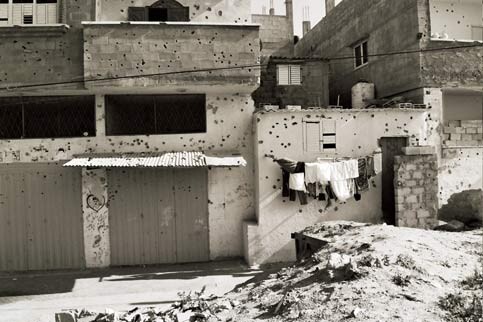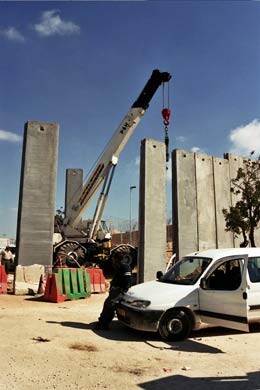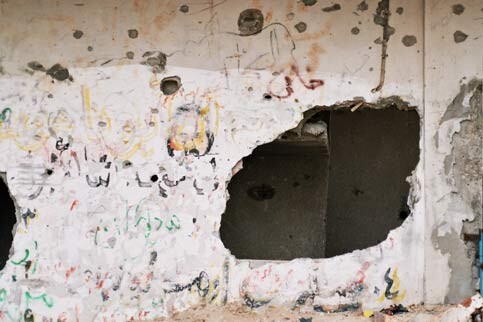The Electronic Intifada Dheisheh refugee camp 4 June 2005

Hanging laundry in Rafah refugee camp, March 2005 (Photo: Nora Barrows-Friedman)
1. The shadow
Shadi sucks on two cigarettes at a time, the twin smoke curling up the side of his right arm like conjoined snakes. The Bethlehem air is crisp and wet; the main street hums with traffic. “Life has a beginning and an end, just like these cigarettes,” he says, pinching them between his calloused fingers. Shadi arches his eyebrow at me, squinting in the muted sunlight streaked across his face. He offers me his L&M pack. I take the last one, and we sit on the curb, silently smoking, watching the three bluish-gray plumes wind themselves up over our heads, dissipating across the concrete rooftops of Dheisheh camp, joining with the hazy fog cover, and settling, invisibly, into the atmosphere, to mingle with the ghosts.
2. Tabouleh

Bethlehem apartheid wall construction, March 2005 (Photo: Nora Barrows-Friedman)
Her son Hassan opens the window next to the stove and looks out beyond the valley, as we talk about the settlement blocs growing, spilling over the ancient hillsides. “Count them, Nora,” he says, his arms spread outside the window, “I can see four of them from this view. Can you believe this?” I am chopping parsley. The pieces are small, but not small enough. Huda, ten minutes later, gasps at my mess. “This is not small. Don’t you know how to make them smaller? Small so that they are almost disappeared?”

Tank shelling in a home, Rafah refugee camp, March 2005 (Photo: Nora Barrows-Friedman)
3. The Closing
Mohammed stares up at the wall. A slash of heavy-grey concrete against a lapis-blue sky. In my broken Arabic, I cluck my tongue as he cranes his neck up, up, up to the top. El jeddar, zoft. Zoft iktheer. (“The wall, it’s bad. Very bad.”) I don’t know what else to say. Mohammed looks down at the stony dry earth, rubs his forehead, places the side of his hand above his brow, and looks up again.
Specialized cranes and bulldozers whine and grumble like tired, old men. They are lifting the sections into place, in a twelve-foot trench in the rocky soil. Workers are inside the trench, placing rebar and concrete into complicated mazes of the foundation for this jeddar, this wall. One of the workers is deaf. They are all Palestinian. Mohammed recognizes one of them from Dheisheh. “I have fourteen children,” one of them explains, handing a wrench to the deaf man. “How am I supposed to feed them if I don’t take this job?” The section makes a hollow, concluding sound when it is lowered into the trench. Mohammed wonders aloud if the deaf man could hear it, touching his finger to his ear, wincing and turning his gaze back to the wall.
Nora Barrows-Friedman, 26, is the Senior Producer and co-host of Flashpoints on Pacifica Radio. She recently spent a month in the Dheisheh Refugee Camp in the occupied West Bank, working with 22 teenagers at the Ibdaa Radio 194, a project of the Ibdaa Cultural Center. When licensed, Ibdaa Radio 194 will be the first community radio station to broadcast from a Palestinian refugee camp, and it will be maintained primarily by the youth of Dheisheh.





